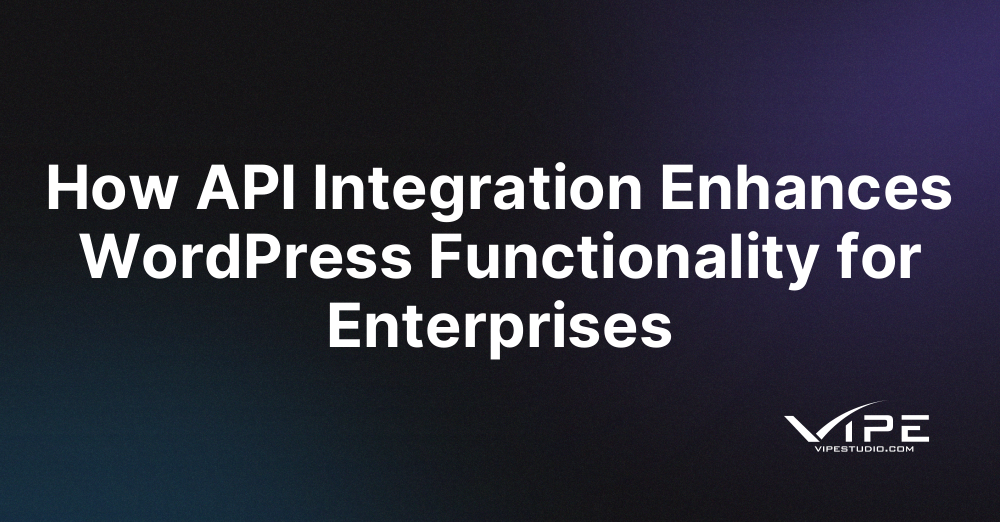21.12.2024
WordPress Development
How API Integration Enhances WordPress Functionality for Enterprises
READING TIME: MIN
Table of Content
In today’s digital age, enterprises require robust, scalable, and interconnected platforms to stay competitive. WordPress, already a versatile CMS, becomes even more powerful with API integration. By connecting WordPress to third-party services and applications, enterprises can streamline workflows, enhance user experiences, and unlock new capabilities. In this article, we’ll explore how API integration transforms WordPress into a dynamic tool for enterprise success.
Understanding API Integration and Its Role in WordPress
An API (Application Programming Interface) acts as a bridge between two applications, allowing them to communicate and exchange data. In the context of WordPress, API integration enables the platform to interact with external systems, services, and tools seamlessly.
Key types of APIs used in WordPress include:
- REST API: Facilitates data exchange between WordPress and other platforms, supporting headless architectures and custom applications.
- Third-Party APIs: Allows WordPress to integrate with CRM systems, payment gateways, analytics tools, and more.
- Custom APIs: Tailored APIs developed to meet specific enterprise needs.
API integration empowers enterprises to extend WordPress beyond its core functionality, transforming it into a comprehensive digital solution.
Streamlining Enterprise Workflows with API Integration
One of the most significant advantages of API integration is its ability to automate and streamline workflows. By connecting WordPress to enterprise tools and systems, businesses can eliminate manual processes and improve efficiency.
Examples of workflow improvements include:
- CRM Integration: Sync user data between WordPress and CRM platforms like Salesforce or HubSpot to enhance customer relationship management.
- Marketing Automation: Connect WordPress with email marketing tools like Mailchimp or Marketo for automated campaigns.
- Data Synchronization: Ensure real-time synchronization of data between WordPress and external databases or systems.
These integrations not only save time but also reduce the risk of errors and inconsistencies, ensuring smoother operations for enterprises.
Enhancing User Experiences with Advanced Functionality
API integration allows enterprises to deliver richer and more personalized user experiences through WordPress. By integrating third-party services, businesses can offer features that meet the specific needs of their audience.
Notable enhancements include:
- Personalized Content: Use APIs to fetch and display personalized recommendations based on user preferences.
- Advanced Search Capabilities: Integrate search APIs like Algolia for faster and more accurate search results.
- Interactive Features: Embed real-time chatbots, live streaming, or social media feeds through API connections.
These features elevate the user experience, leading to higher engagement and satisfaction.
Boosting Scalability and Performance with API-Driven Architecture
For enterprises, scalability and performance are critical factors in maintaining digital operations. API integration helps WordPress handle large-scale demands by offloading certain functionalities to external systems.
Scalability benefits include:
- Decoupled Architecture: Use APIs to create a headless WordPress setup, separating the front-end and back-end for improved performance.
- Cloud Integration: Connect WordPress to cloud platforms like AWS or Google Cloud for enhanced scalability and reliability.
- Load Distribution: Leverage APIs to distribute workloads across multiple systems, reducing strain on the WordPress server.
These strategies ensure that enterprise websites remain fast, responsive, and capable of handling high traffic volumes.
Common Challenges in API Integration and How to Overcome Them
While API integration offers immense benefits, it also comes with challenges that enterprises must address:
- Complexity: Integrating multiple APIs can become complicated, requiring expertise in development and system architecture.
- Security Concerns: APIs can be potential entry points for cyberattacks if not properly secured.
- Compatibility Issues: Not all APIs work seamlessly with WordPress, requiring custom solutions.
These challenges can be mitigated by working with experienced developers who understand API integration best practices and enterprise requirements.
Why Vipe Studio Is Your Partner for API Integration
At Vipe Studio, we specialize in custom API integration services for WordPress. Our team has extensive experience in connecting WordPress to enterprise systems, ensuring seamless and secure integrations tailored to your business needs.
Our API integration services include:
- Custom API development to meet unique enterprise requirements.
- Integration with third-party tools like CRMs, analytics platforms, and payment gateways.
- Performance optimization for API-driven WordPress solutions.
- Ongoing support and maintenance to ensure smooth operations.
If you’re ready to enhance your WordPress website with powerful API integrations, contact Vipe Studio today to learn more.
Conclusion: Unlock the Full Potential of WordPress with API Integration
API integration is a transformative capability that enables enterprises to extend WordPress functionality, streamline workflows, and deliver exceptional user experiences. From CRM integration to performance optimization, APIs empower businesses to meet the demands of modern digital operations. For enterprises looking to stay ahead in a competitive landscape, leveraging API integration with WordPress is a strategic move that drives innovation and growth.
More on The Topic
- Navigating WooCommerce Performance: Real-World Strategies
- The Role of AI in WordPress Development Workflows
- Optimizing WordPress for Enterprise: Beyond Basic Caching
- WordPress and Headless Commerce: A Provocative Dilemma
- Decoupled WordPress Architecture: The Future or a Fad?
The content of this website is copyrighted and protected by Creative Commons 4.0.



